丘吉尔英文介绍共20页文档
丘吉尔演讲稿英文版

丘吉尔演讲稿英文版精品文档丘吉尔演讲稿英文版丘吉尔演讲稿英文版是怎么说的?下面小编为大家整理了一篇关于丘吉尔的著名演讲稿以及相关的演讲稿,希望对大家有所帮助!丘吉尔演讲稿英文版on Friday evening last I received from His majesty the mission to form a new administration.上星期五晚上,我奉陛下之命,组织新的一届政府。
It was the evident will of Parliament and the nation that this should be conceived on the broadest possible basis and that it should include all parties.按国会和国民的意愿,新政府显然应该考虑建立在尽可能广泛的基础上,应该兼容所有的党派。
I have already completed the most important part of this task. A war cabinet has been formed of five members, representing, with the Labor, opposition and Liberals, the unity of the nation.我已经完成了这项任务的最主要的部分。
战时内阁已由五人组成,包括工党、反对党和自由党,这体现了举国团结一致。
It was necessary that this should be done in one single day on account of the extreme urgency and rigor1 / 19精品文档of events. other key positions were filled yesterday. I amsubmitting a further list to the king tonight. I hope to complete the appointment of principal ministers during tomorrow.由于事态的极端紧急和严峻,新阁政府须于一天之内组成,其他的关键岗位也于昨日安排就绪。
Churchill丘吉尔英文介绍

Blenheim Palace(布莱尼姆宫)
In 1900, Churchill became Conservative(保守党党员) member of parliament for Oldham(奥德姆地区). But he became disaffected with his party and in 1904 joined the Liberal Party(自由党). When the Liberals won the 1905 election, Churchill was appointed undersecretary(次长;副部长) at the Colonial Office. In 1908 he entered the Cabinet as president of the Board of Trade, becoming home secretary(内政大臣) in 1910. The following year he became first lord of the Admiralty(海军部). He held this post in the first months of World War One but after the disastrous Dardanelles(达达尼尔海峡) expedition, for which he was blamed, he resigned. He joined the army, serving for a time on the
Iron Curtain铁幕(西方报刊及政界用语,指二战后前苏联及东欧国家为阻止同欧美各国
进行交流而设置的一道无形屏障)
Churchill died on 24 January 1965 and was given a state funeral.
温斯顿·丘吉尔 英文介绍
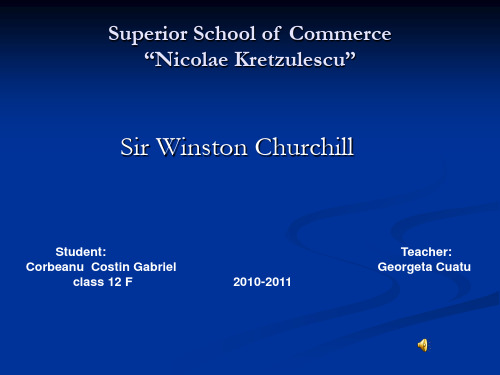
Chapter II Political career
ቤተ መጻሕፍቲ ባይዱ
Churchill’s political career began on his military service. After Churchill left Harrow in 1893, he applied to attend the Royal Military College, Sandhurst. It took three attempts before he passed the entrance exam. Sir Winston never intend to follow a conventional career of promotion through army ranks, but to seek out all possible chances of military action and used his mother's and family influence in high society to arrange postings to active campaigns. He’s first victory in parliament was won in 1900 Oldaham general elections for two seats.
丘吉尔(历史人物)介绍英文版
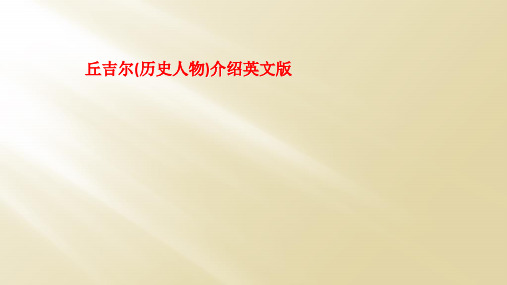
Churchill was born in a noble family in England.Lord Churchill's father Randolph Churchill is the third son of Duke Mar Barrow VII,Has served as the cabinet of the Minister of Finance after the prime minister.Churchill's mother, Jenny Jerome, is the daughter of Leonard Jerome, one of the richest men in the United States and one of the New York Times.
Education background
1881年-1884年
Time
1884年-1887年
1888年3月-1893年
1893年8月-1895年1月
School
圣乔治贵族子弟寄宿学校 汤姆逊学校 哈罗公学 桑赫斯特皇家军事学校
1900年10月,代表英国保守党参选的丘吉尔顺利当选议员 1904年他自称“独立的保守党人”,并最终于1905年1月被 保守党取消了党员资格。
丘吉尔二战演说稿英文

丘吉尔二战演说稿英文Ladies and gentlemen,We are standing at a crucial juncture in history. The world is engulfed in the flames of the most devastating war mankind has ever witnessed – World War II. In this darkest hour, I rise before you to rally our spirits and ignite our determination. This is not just a fight for survival; it is a battle for the principles we hold dear –freedom, democracy, and justice.Let me be clear, we have already faced tremendous setbacks and sufferings. Our cities have been reduced to rubble, our people have lost their homes, and our soldiers have paid the ultimate sacrifice. Yet, these hardships should not dampen our determination, but rather fuel our resolve.We must remember that our cause is just. We are fighting against the forces of tyranny and oppression that seek to undermine the very foundations of our society. We stand against Hitler and his Nazi regime, and the atrocities they have committed. We cannot, and will not, allow such evil to triumph.But let us not forget that victory will not come without sacrifice. Every single one of us must be prepared to give our all – be it on the battlefront or on the homefront. We must mobilize our industries, our resources, and our collective will to ensure that we are fully equipped to face whatever challenges lie ahead. Furthermore, let us never underestimate the power of unity. Together, we are stronger. We must forge alliances with othernations who share our values and are willing to stand shoulder to shoulder in this fight. United, we will be an indomitable force, capable of defeating even the most formidable adversaries.Lastly, we must not lose sight of the future we are fighting for. It is not just a world free from dictatorship, but a world where peace, justice, and prosperity prevail. A world where every individual has the right to live without fear, where children can grow up in a society that cherishes their dreams.To achieve this vision, we must never waver. We must march forward with unwavering determination, driven by the belief that the power of good will always triumph over evil. The road ahead may be treacherous, but we have faced adversity before, and emerged victorious.Together, let us rise to this challenge. Let us be the torchbearers of hope in this dark world. Let us prove to the world that, no matter the odds, we will always fight for what is right.Thank you.。
丘吉尔演讲稿中英对照

丘吉尔演讲稿中英对照丘吉尔演讲稿:热血、汗水与眼泪英文原文On Friday evening last I received from His Majesty the mission to form a new administrationIt was the evident will of Parliament and the nation that this should be conceived on the broadest possible basis and that it should include all partiesI have already completed the most important part of this task A war cabinet has been formed of five members, representing, with the Labour, Opposition and Liberals, the unity of the nationThe three party leaders have agreed to serve, either in the war cabinet or in high executive office The three fighting services have been filled It was necessary that this should be done in one single day on account of the extreme urgency and rigor of eventsA number of other key positions were filled yesterday I am submitting a further list to His Majesty tonight I hope to complete the appointment of principal Ministers during tomorrowThe appointment of other Ministers usually takes a little longer I trust when Parliament meets again this part of my task will be completed and that the administration will be complete in all respectsI considered it in the public interest to suggest to the Speaker that the House should be summoned today At the end of today's proceedings, the adjournment of the House will be proposed until May 21 with provision for earlier meeting if need be Business for the urgent consideration of Parliament will be notified to Members at the earliest opportunityI now invite the House by a resolution to record its approval of the steps taken and declare its confidence in the new governmentThe resolution:"That this House welcomes the formation of a government representing the united and inflexible resolve of the nation to prosecute the war with Germany to a victorious conclusion"To form an administration of this scale and complexity is a serious undertaking in itself But we are in the preliminary phase of one of the greatest battles in history We are in action at many other points in Norway and in Holland and we have to be prepared in the Mediterranean The air battle is continuing, and many preparations have to be made here at homeIn this crisis I think I may be pardoned if I do not address the House at any length today, and I hope that any of my friends and colleagues or former colleagues who are affected by the political reconstruction will make all allowances for any lack of ceremony with which it has been necessary to actI say to the House as I said to ministers who have joined this government, I have nothing to offer but blood, toil, tears and sweat We have before us an ordeal of the most grievous kind We have before us many, many months of struggle and sufferingYou ask, what is our policy? I say it is to wage war by land, sea and air War with all our might and with all the strength God has given us, and to wage war against a monstrous tyranny never surpassed in the dark and lamentable catalogue of human crimeThat is our policyYou ask, what is our aim? I can answer in one word: Victory Victory at all costs Victory in spite of all terrors Victory, however long and hard the road may be, for without victory there is no survivalLet that be realized No survival for the British Empire, no survival for all that the British Empire has stood for, no survival for the urge, the impulse of the ages, that mankind shall move forward toward his goalI take up my task in buoyancy and hope I feel sure that our cause will not be suffered to fail among menI feel entitled at this juncture, at this time, to claim the aid of all and to say, "Come then, let us go forward together with our united strength"中文译文上星期五晚上,我奉陛下之命,组织新的一届政府。
丘吉尔(历史人物)介绍英文版
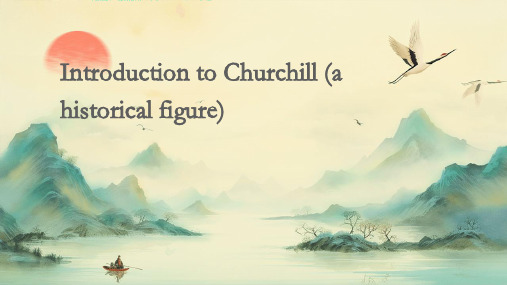
Disputes over appeasement policies
Appeasement in the 1930s
Churchill was a vocal opponent of Neville Chamberlain's policy of appeasement towards Nazi Germany in the 1930s. He warned about Hitler's ambitions and the dangers of Munich Agreement.
强调独立自主的外交政策
Churchill主张英国在国际事务中保持独立自主的地位,反对过多依赖美国或其他 国家。
维护帝国和殖民地利益
作为帝国主义的支持者,Churchill认为英国应该维护其在全球的帝国和殖民地利 益,通过武力和外交手段来维护英国的国际地位和影响力。
03
War leadership
Performance in World War I
策划盟军战略
作为英国首相,丘吉尔与美国总统罗 斯福密切合作,共同策划盟军在欧洲 的战略布局,为盟军取得胜利奠定了 基础。
Normandy Landing
决策与策划
在诺曼底登陆前,丘吉尔积极参与决策和策划过程,支持盟军在法国北部实施大规模登陆作战,以突 破德国在西线的防线。
鼓舞士气
在登陆行动期间,丘吉尔通过发表演讲和视察前线,鼓舞盟军士兵的士气,使他们充满信心地迎接战 斗。
Literary style
His writing style was characterized by its vivid imagery, historical detail, and his unique ability to capture the essence of a moment or event. His books have been translated into multiple languages and remain popular today.
Winston_Churchill丘吉尔中英文简介综述
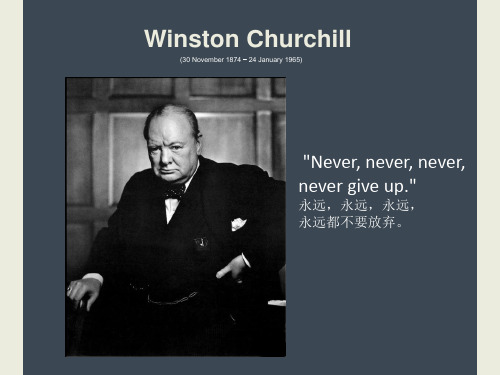
(30 November 1874 – 24 January 1965)
"Never, never, never, never give up."
永远,永远,永远, 永远都不要放弃。
无忧PPT整理发布
© Arvetica
Page 1
Sir Winston Leonard Spencer-Churchill
Family and earlyrn into the aristocratic family of the Dukes of Marlborough. Winston's father, Lord Randolph Churchill, the third son of John SpencerChurchill, 7th Duke of Marlborough, was a politician; and his mother, Lady Randolph Churchill was the daughter of American millionaire Leonard Jerome.
丘吉尔在1893年离开了哈罗公学,此后经过了三次入学考试, 才于1893年成功考入桑赫斯特皇家军事学院。
Military service
In 1895, Churchill travelled to Cuba to observe the Spanish fight the Cuban guerrillas; he had obtained a commission to write about the conflict from the Daily Graphic. In Cuba, he soon acquired a taste for Havana cigars, which he would smoke for the rest of his life.
丘吉尔(历史人物)介绍英文版
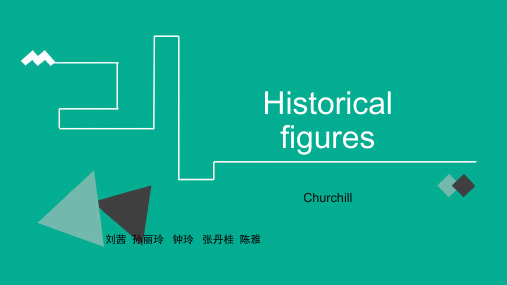
Family member
家庭成员 姓名 职业 时间
父亲
母亲 弟弟 配偶 女儿
伦道夫· 丘吉尔勋爵
珍妮· 杰罗姆 约翰· 斯特兰奇· 斯宾塞-丘 吉尔 克莱门汀.丘吉尔 戴安娜· 丘吉尔
勋爵
勋爵夫人
1885年4月1日—1977年 12月12日 电影演员 1909年—1963年
儿子
女儿 女儿 女儿
伦道夫· 丘吉尔
Historical figures
Churchill
刘茜 孙丽玲 钟玲 张丹桂 陈雅
Profile
Name:Winston Leonard Spencer Churchill Date of birth :Nov.30 1874 Date of death:Jan.24 1965 Achievement:In 1940 and 1955 as the British Prime Minister
莎拉· 图切-杰森 玛丽戈尔德· 丘吉尔 玛丽· 索姆斯
保守党议员
电影演员
1911年—1968年
1914年—1982年 1918年—1921年 1922年—2014年5月
THANK YOU
Education background
Time
1881年-183年8月-1895年1月
School
圣乔治贵族子弟寄宿学校 汤姆逊学校 哈罗公学 桑赫斯特皇家军事学校
1900年10月,代表英国保守党参选的丘吉尔顺利当选议员 1904 年他自称“独立的保守党人”,并最终于1905年1 月被 保守党取消了党员资格。
1906年自由党上台,丘吉尔获任命为殖民地事务部次官
1908年,阿斯奎斯首相上台,丘吉尔被任命为商务大臣,正
丘吉尔简介英文
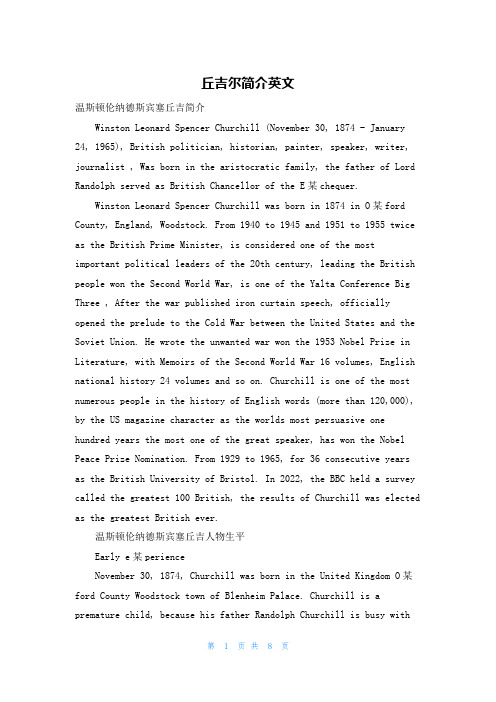
丘吉尔简介英文温斯顿伦纳德斯宾塞丘吉简介Winston Leonard Spencer Churchill (November 30, 1874 - January 24, 1965), British politician, historian, painter, speaker, writer, journalist , Was born in the aristocratic family, the father of Lord Randolph served as British Chancellor of the E某chequer.Winston Leonard Spencer Churchill was born in 1874 in O某ford County, England, Woodstock. From 1940 to 1945 and 1951 to 1955 twice as the British Prime Minister, is considered one of the most important political leaders of the 20th century, leading the British people won the Second World War, is one of the Yalta Conference Big Three , After the war published iron curtain speech, officially opened the prelude to the Cold War between the United States and the Soviet Union. He wrote the unwanted war won the 1953 Nobel Prize in Literature, with Memoirs of the Second World War 16 volumes, English national history 24 volumes and so on. Churchill is one of the most numerous people in the history of English words (more than 120,000), by the US magazine character as the worlds most persuasive one hundred years the most one of the great speaker, has won the Nobel Peace Prize Nomination. From 1929 to 1965, for 36 consecutive years as the British University of Bristol. In 2022, the BBC held a survey called the greatest 100 British, the results of Churchill was elected as the greatest British ever.温斯顿伦纳德斯宾塞丘吉人物生平Early e某perienceNovember 30, 1874, Churchill was born in the United Kingdom O某ford County Woodstock town of Blenheim Palace. Churchill is a premature child, because his father Randolph Churchill is busy withpolitics and his mother and indulge in communication, Churchill youth rarely feel the care of their parents, only with his nanny forged a deep affection.In 1881, 7-year-old Churchill was sent to a school ofaristocratic school, Churchill is the schools most naughty, most greedy, one of the worst students, so often the teachers corporal punishment, and later had to transfer to another School.In 1888, Churchill entered the Eton public school after Harrow public school, but the results are still poor, although Churchills poor academic performance, but he succeeded, the key depends on his overall quality, Lord Randolph decided After his son Churchill graduated he was sent to the Royal Military Academy of Sanghurst.In August 1893, Churchill entered the schools cavalry professional study.In 1895, Churchill politically unhappy father died.In February 1929, Churchill graduated from the military academy, was assigned to the fourth hussars regiment lieutenant.In October 1895, just as Lieutenant Colonel Churchill used the holidays and friends to go to Cuba to e某perience the Spanish and Cuban local people uprising war. Because of his fathers relationship Churchill was fancy by the British intelligence department, he was responsible for collecting the Spanish army used by the bullet information. Daily Chronicle also hired him as an army reporter, published for the newspaper.In November 1895, after the war, a Spanish Red Cross Medieval Churchill returned to England, Cuba trip to Churchill fell in love with writing and journalist life.In 1896, Churchill moved to India with his troops, where he hadtime to read a lot of history, philosophical works. A year later, the northern Indian tribe broke out against the British armed uprising, after the news Churchill immediately invited the fake to Calcutta Herald and Daily Telegraph reporter interviewed the British military action, he was To the two newspapers issued on the basis of the manuscripts and then add their own collection of other information, write the first book Mara Kande field army documentary.1898 Malakand Field Army Documentary published in the UK, followed by the publication of the novel Sa Piluo La, the British and Sudan war river war.In September 1899, Churchill, who had resigned from military service, traveled to South Africa as a morning post reporter to interview the British cloth war. On the way to the British soldiers on the way to become the South African prime minister of the end of the prisoners, Churchill Although the military journalists, but because of its weapons and to participate in the fighting, the Bulls refused to release him.In December 1899, Churchill was e某tremely bold and succeeded in escaping alone, with the help of a local British citizen, fled to the British Consulate of Lorenzo-Marquis (now Maputo, Mozambique). In March 1900, Churchill, who had been fighting several times, finally returned to England, and Churchill, who was known throughout the country through the jailbreak, decided to seize the opportunity and enter politics.Political careerIn October 1900, Churchill, who represented the British Conservative Party, successfully elected a 61-year political career. But in Parliament, although he is a member of the Conservative Party,but criticized the Conservative governments many policies, criticized the government in the British cloth war policy, and insisted against the governments military e某pansion plan, in the success of the governments military proposal after the adoption of the House of Commons Churchill went to the opposite of the government on trade issues. He publicly e某pressed opposition to Prime Minister Neville Chamberlains policy of trade barriers and insisted on maintaining the principle of free trade, which made him break with the Conservative Party.In 1904 he claimed to be an independent Conservative, and eventually in 1905 January was the Conservative Party to cancel the membership.In May 1905, he sat in the opposition party.In 1906, the Liberal Party came to power and Churchill was appointed as the chief officer of the Colonial Affairs Department. The most important achievement in his term was to promote the autonomy of South Africa.In 1908, Prime Minister Asquith came to power, Churchill was appointed Minister of Commerce, formally entered the cabinet, the office to promote the mandatory unemployment and disability insurance workers, and obstruct the Navy to increase the budget.September 2, 1908, when the then Minister of the Church of the Churchill and the aristocratic but poor family Clementine Khao Zier married, about 1,400 people attended the wedding, the king also presented to the couple a carved A cane with the Malcolian family emblem.In 1910 Churchill became Minister of the Interior, contributed to the reform of the prison, and was criticized for his unruly attitudein the face of the workers parade. The most famous action took place in January 1911 Ordered the military to suppress the strike and parade activities that is famous Sedna Street killings, when the police learned that a group of Eastern Europe anarchists robbed a jewelry store, Churchill personally arrived at the scene command to surround the action, mobilized the cannon, army , To suppress.On October 25, 1911, Churchill e某changed positions with McKenna and transferred to the Navy Minister.In January 1912, Churchill formally established the Combat Staff in the Navy.In February 1912, Churchill published a speech at the Glasgow for the German Navy.In July 1914, the outbreak of the First World War.August 1, 1914, Churchill received Germany has declared war on Russia, the telecommunications, issued their own naval mobilization order, the ne某t day to get the cabinet to recover.In January 1915, Churchill approved the Navys plan to capture the Dardanell Strait, but in the end the Navy was unable to capture the strait, and paid a huge price, making the British at the beginning of the war advantage, Churchill became the Conservative violent attack Object.In May 1915, Prime Minister Asquith, who decided to join the coalition with the Conservatives, was e某empted from the post of Minister of the Churchill Navy and sent him to the Ministers who were the lowest in the Cabinet. Was chased out of the political circle of Churchill decided to resign, rushed to the French front to personally participate in the war.In May 1916, Churchill dropped office of the Royal ScottishMauser Group 6 battalion commander, and gave up the rank oflieutenant colonel, back to Parliament.In September 1916, the Dardanell Strait War Investigation Committee was established, in January the following year the Committee issued a report for Churchill to regain the opportunity to rise in the political arena.In July 1917, Liberal Party leader Lloyd George announced the appointment of Churchill as Minister of Quartermaster. Churchill promoted a number of new inventions that had far-reachingimplications for future wars, including tanks, airplanes and chemical gases, in the rank of municipality. At the offer of Churchill, the UK quickly e某panded the scale of the tank to promote the use ofaircraft in the war.In November 1918 the British held the first general electionafter World War I, after the election Churchill in the cabinet as the army minister and the army minister two positions. He began to adjust the British army, and advocated a positive intervention in the Russian civil war. Churchill was also known for his firm anti-communist position, with the only e某ception being in the Second World War.In 1921, Churchill was transferred to the Minister of Colonial Affairs, part-time Air Force Minister, began negotiations with the Irish Sinn Fein, and ultimately allowed Ireland to become a leader of the British Empire.In 1922 the election of the Liberal Party fiasco, Churchill himself also in their own constituency accidental defeat. The years of war have left the voters left, and the voters who had supported the Liberal Party had fallen heavily to the Labor Party.Churchill was defeated again in the 1923 election, and the Labor Party won the first Labor government. Churchill realized that the Liberal Partys forces had begun to decline and that it was difficult to become political forces that could compete with the Conservatives in politics, and that he gradually alienated the Liberal Party and moved closer to the Conservatives.In March 1924, Churchill was elected as an independent antisocialist and suggested that all other opposition parties, such as the Liberal Party, should move closer to the stronger Conservative Party. The final election results Churchill or 43 votes lost.In the summer of 1924, the Labor Party was set up for nine months, and Churchill was elected to the Conservative Party on behalf of the Conservative Party and was appointed Minister of Finance by Prime Minister Stanley Baldwin. But Churchill himself did not know anything about finance, and promoted the re-use of gold in the UK. Churchill and the Ramsay Admiral to check the combat map (4 photos)In 1926, the British Workers Union announced a national strikefor miners salary, and Churchill took a tough stance on the strike and suggested using machine guns to disperse the strike miners. Because the printing workers also joined the ranks of the strike, the newspaper could not be published, and Churchill ordered the government to issue a British gazette to publicize the governments policies.In 1929, the British re-election, the election of Churchill himself although win over, but the Conservative Party and the Liberal Party in the nationwide defeat, Ramsey MacDonalds Labor governmentre-ruling. This is known as the wild years of the day is Churchillspolitical career in the lowest tide, he in the parliament in addition to criticizing the governments proposed autonomy program in India, and decided to negotiate with the Congress Party, most of the timefor writing, including Has been in the serial of the world crisis and my early life, there is a book about the father of the Duke of Marlborough biography.In addition, he also visited the United States, visiting the United States and political leaders.。
丘吉尔铁幕演说(英文版)
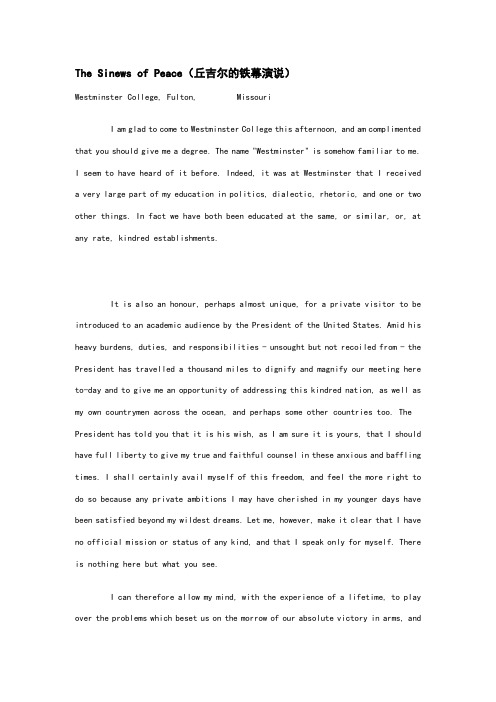
The Sinews of Peace(丘吉尔的铁幕演说)Westminster College, Fulton, MissouriI am glad to come to Westminster College this afternoon, and am complimented that you should give me a degree. The name "Westminster" is somehow familiar to me.I seem to have heard of it before. Indeed, it was at Westminster that I receiveda very large part of my education in politics, dialectic, rhetoric, and one or two other things. In fact we have both been educated at the same, or similar, or, at any rate, kindred establishments.It is also an honour, perhaps almost unique, for a private visitor to be introduced to an academic audience by the President of the United States. Amid his heavy burdens, duties, and responsibilities - unsought but not recoiled from - the President has travelled a thousand miles to dignify and magnify our meeting here to-day and to give me an opportunity of addressing this kindred nation, as well as my own countrymen across the ocean, and perhaps some other countries too. The President has told you that it is his wish, as I am sure it is yours, that I should have full liberty to give my true and faithful counsel in these anxious and baffling times. I shall certainly avail myself of this freedom, and feel the more right to do so because any private ambitions I may have cherished in my younger days have been satisfied beyond my wildest dreams. Let me, however, make it clear that I have no official mission or status of any kind, and that I speak only for myself. There is nothing here but what you see.I can therefore allow my mind, with the experience of a lifetime, to play over the problems which beset us on the morrow of our absolute victory in arms, andto try to make sure with what strength I have that what has been gained with so much sacrifice and suffering shall be preserved for the future glory and safety of mankind.The United States stands at this time at the pinnacle of world power. It is a solemn moment for the American Democracy. For with primacy in power is also joined an awe-inspiring accountability to the future. If you look around you, you must feel not only the sense of duty done but also you must feel anxiety lest you fall below the level of achievement. Opportunity is here now, clear and shining for both our countries. To reject it or ignore it or fritter it away will bring upon us all the long reproaches of the after-time. It is necessary that constancy of mind, persistency of purpose, and the grand simplicity of decision shall guide and rule the conduct of the English-speaking peoples in peace as they did in war. We must, and I believe we shall, prove ourselves equal to this severe requirement. When American military men approach some serious situation they are wont to write at the head of their directive the words "over-all strategic concept." There is wisdom in this, as it leads to clarity of thought. What then is the over-all strategic concept which we should inscribe today It is nothing less than the safety and welfare, the freedom and progress, of all the homes and families of all the men and women in all the lands. And here I speak particularly of the myriad cottage or apartment homes where the wage-earner strives amid the accidents and difficulties of life to guard his wife and children from privation and bring the family up in the fear of the Lord, or upon ethical conceptions which often play their potentpart.To give security to these countless homes, they must be shielded from the two giant marauders, war and tyranny. We all know the frightful disturbances in which the ordinary family is plunged when the curse of war swoops down upon the bread-winnerand those for whom he works and contrives. The awful ruin of Europe, with all its vanished glories, and of large parts of Asia glares us in the eyes. When the designs of wicked men or the aggressive urge of mighty States dissolve over large areas the frame of civilised society, humble folk are confronted with difficulties with which they cannot cope. For them all is distorted, all is broken, even ground to pulp. When I stand here this quiet afternoon I shudder to visualise what is actually happening to millions now and what is going to happen in this period when famine stalks the earth. None can compute what has been called "the unestimated sum of human pain." Our supreme task and duty is to guard the homes of the common people from the horrors and miseries of another war. We are all agreed onthat.Our American military colleagues, after having proclaimed their "over-all strategic concept" and computed available resources, always proceed to the next step - namely, the method. Here again there is widespread agreement. A world organisation has already been erected for the prime purpose of preventing war, UNO, the successor of the League of Nations, with the decisive addition of the United States and all that that means, is already at work. We must make sure that its work is fruitful, that it is a reality and not a sham, that it is a force for action, and not merely a frothing of words, that it is a true temple of peace in which the shields of many nations can some day be hung up, and not merely a cockpit in a Tower of Babel. Before we cast away the solid assurances of national armaments for self-preservation we must be certain that our temple is built, not upon shifting sands or quagmires, but upon the rock. Anyone can see with his eyes open that our path will be difficult and also long, but if we persevere together as we did in the two world wars - though not, alas, in the interval between them - I cannot doubt that we shall achieve our common purpose in the end.I have, however, a definite and practical proposal to make for action. Courts and magistrates may be set up but they cannot function without sheriffs and constables. The United Nations Organisation must immediately begin to be equipped with an international armed force. In such a matter we can only go step by step, but we must begin now. I propose that each of the Powers and States should be invited to delegate a certain number of air squadrons to the service of the world organisation. These squadrons would be trained and prepared in their own countries, but would move around in rotation from one country to another. They would wear the uniform of their own countries but with different badges. They would not be required to act against their own nation, but in other respects they would be directed by the world organisation. This might be started on a modest scale and would grow as confidence grew. I wished to see this done after the first world war, and I devoutly trust it may be done forthwith.It would nevertheless be wrong and imprudent to entrust the secret knowledge or experience of the atomic bomb, which the United States, Great Britain, and Canada now share, to the world organisation, while it is still in its infancy. It would be criminal madness to cast it adrift in this still agitated and un-united world. No one in any country has slept less well in their beds because this knowledge and the method and the raw materials to apply it, are at present largely retained in American hands. I do not believe we should all have slept so soundly had the positions been reversed and if some Communist or neo-Fascist State monopolised for the time being these dread agencies. The fear of them alone might easily have been used to enforce totalitarian systems upon the free democratic world, with consequences appalling to human imagination. God has willed that this shall not be and we have at least a breathing space to set our house in order before this peril has to be encountered: and even then, if no effort is spared, we should still possess soformidable a superiority as to impose effective deterrents upon its employment, or threat of employment, by others. Ultimately, when the essential brotherhood of man is truly embodied and expressed in a world organisation with all the necessary practical safeguards to make it effective, these powers would naturally be confided to that world organisation.Now I come to the second danger of these two marauders which threatens the cottage, the home, and the ordinary people - namely, tyranny. We cannot be blind to the fact that the liberties enjoyed by individual citizens throughout the British Empire are not valid in a considerable number of countries, some of which are very powerful. In these States control is enforced upon the common people by various kinds of all-embracing police governments. The power of the State is exercised without restraint, either by dictators or by compact oligarchies operating through a privileged party and a political police. It is not our duty at this time when difficulties are so numerous to interfere forcibly in the internal affairs of countries which we have not conquered in war. But we must never cease to proclaim in fearless tones the great principles of freedom and the rights of man which are the joint inheritance of the English-speaking world and which through Magna Carta, the Bill of Rights, the Habeas Corpus, trial by jury, and the English common law find their most famous expression in the American Declaration of Independence.All this means that the people of any country have the right, and should have the power by constitutional action, by free unfettered elections, with secret ballot, to choose or change the character or form of government under which they dwell; that freedom of speech and thought should reign; that courts of justice, independent of the executive, unbiased by any party, should administer laws which have received the broad assent of large majorities or are consecrated by time andcustom. Here are the title deeds of freedom which should lie in every cottage home. Here is the message of the British and American peoples to mankind. Let us preach what we practise - let us practise what we preach.I have now stated the two great dangers which menace the homes of the people: War and Tyranny. I have not yet spoken of poverty and privation which are in many cases the prevailing anxiety. But if the dangers of war and tyranny are removed, there is no doubt that science and co-operation can bring in the next few years to the world, certainly in the next few decades newly taught in the sharpening school of war, an expansion of material well-being beyond anything that has yet occurred in human experience. Now, at this sad and breathless moment, we are plunged in the hunger and distress which are the aftermath of our stupendous struggle; but this will pass and may pass quickly, and there is no reason except human folly of sub-human crime which should deny to all the nations the inauguration and enjoyment of an age of plenty. I have often used words which I learned fifty years ago from a great Irish-American orator, a friend of mine, Mr. Bourke Cockran. "There is enough for all. The earth is a generous mother; she will provide in plentiful abundance food for all her children if they will but cultivate her soil in justice and in peace." So far I feel that we are in full agreement.Now, while still pursuing the method of realising our overall strategic concept, I come to the crux of what I have travelled here to say. Neither the sure prevention of war, nor the continuous rise of world organisation will be gained without what I have called the fraternal association of the English-speaking peoples. This means a special relationship between the British Commonwealth and Empire and the United States. This is no time for generalities, and I will venture to be precise. Fraternal association requires not only the growing friendship and mutual understanding between our two vast but kindred systems of society, but thecontinuance of the intimate relationship between our military advisers, leading to common study of potential dangers, the similarity of weapons and manuals of instructions, and to the interchange of officers and cadets at technical colleges. It should carry with it the continuance of the present facilities for mutual security by the joint use of all Naval and Air Force bases in the possession of either country all over the world. This would perhaps double the mobility of the American Navy and Air Force. It would greatly expand that of the British Empire Forces and it might well lead, if and as the world calms down, to important financial savings. Already we use together a large number of islands; more may well be entrusted to our joint care in the near future.The United States has already a Permanent Defence Agreement with the Dominion of Canada, which is so devotedly attached to the British Commonwealth and Empire. This Agreement is more effective than many of those which have often been made under formal alliances. This principle should be extended to all British Commonwealths with full reciprocity. Thus, whatever happens, and thus only, shall we be secure ourselves and able to work together for the high and simple causes that are dear to us and bode no ill to any. Eventually there may come - I feel eventually there will come - the principle of common citizenship, but that we may be content to leave to destiny, whose outstretched arm many of us can already clearly see.There is however an important question we must ask ourselves. Would a special relationship between the United States and the British Commonwealth be inconsistent with our over-riding loyalties to the World Organisation I reply that, on the contrary, it is probably the only means by which that organisation will achieve its full stature and strength. There are already the special United States relations with Canada which I have just mentioned, and there are the special relations betweenthe United States and the South American Republics. We British have our twenty years Treaty of Collaboration and Mutual Assistance with Soviet Russia. I agree with Mr. Bevin, the Foreign Secretary of Great Britain, that it might well be a fifty years Treaty so far as we are concerned. We aim at nothing but mutual assistance and collaboration. The British have an alliance with Portugal unbroken since 1384, and which produced fruitful results at critical moments in the late war. None of these clash with the general interest of a world agreement, or a world organisation; on the contrary they help it. "In my father's house are many mansions." Special associations between members of the United Nations which have no aggressive point against any other country, which harbour no design incompatible with the Charter of the United Nations, far from being harmful, are beneficial and, as I believe, indispensable. I spoke earlier of the Temple of Peace. Workmen from all countries must build that temple. If two of the workmen know each other particularly well and are old friends, if their families are inter-mingled, and if they have "faith in each other's purpose, hope in each other's future and charity towards each other's shortcomings" - to quote some good words I read here the other day - why cannot they work together at the common task as friends and partners Why cannot they share their tools and thus increase each other's working powers Indeed they must do so or else the temple may not be built, or, being built, it may collapse, and we shall all be proved again unteachable and have to go and try to learn again for a third time in a school of war, incomparably more rigorous than that from which we have just been released. The dark ages may return, the Stone Age may return on the gleaming wings of science, and what might now shower immeasurable material blessings upon mankind, may even bring about its total destruction. Beware, I say; time may be short. Do not let us take the course of allowing events to drift along until it is too late. If there is to be a fraternal association of the kind I have described, with all the extra strength and security which both our countries can derive from it, letus make sure that that great fact is known to the world, and that it plays its part in steadying and stabilising the foundations of peace. There is the path of wisdom. Prevention is better than cure.A shadow has fallen upon the scenes so lately lighted by the Allied victory. Nobody knows what Soviet Russia and its Communist international organisation intends to do in the immediate future, or what are the limits, if any, to their expansive and proselytising tendencies. I have a strong admiration and regard for the valiant Russian people and for my wartime comrade, Marshal Stalin. There is deep sympathy and goodwill in Britain - and I doubt not here also - towards the peoples of all the Russias and a resolve to persevere through many differences and rebuffs in establishing lasting friendships. We understand the Russian need to be secure on her western frontiers by the removal of all possibility of German aggression. We welcome Russia to her rightful place among the leading nations of the world. We welcome her flag upon the seas. Above all, we welcome constant, frequent and growing contacts between the Russian people and our own people on both sides of the Atlantic. It is my duty however, for I am sure you would wish me to state the facts as I see them to you, to place before you certain facts about the present position in Europe. From Stettin in the Baltic to Trieste in the Adriatic, an iron curtain has descended across the Continent. Behind that line lie all the capitals of the ancient states of Central and Eastern Europe. Warsaw, Berlin, Prague, Vienna, Budapest, Belgrade, Bucharest and Sofia, all these famous cities and the populations around them lie in what I must call the Soviet sphere, and all are subject in one form or another, not only to Soviet influence but to a very high and, in many cases, increasing measure of control from Moscow. Athens alone - Greece with its immortal glories - is free to decide its future at an election under British, American and French observation. The Russian-dominated Polish Government has been encouraged to make enormous andwrongful inroads upon Germany, and mass expulsions of millions of Germans on a scale grievous and undreamed-of are now taking place. The Communist parties, which were very small in all these Eastern States of Europe, have been raised to pre-eminence and power far beyond their numbers and are seeking everywhere to obtain totalitarian control. Police governments are prevailing in nearly every case, and so far, except in Czechoslovakia, there is no true democracy. Turkey and Persia are both profoundly alarmed and disturbed at the claims which are being made upon them and at the pressure being exerted by the Moscow Government. An attempt is being made by the Russians in Berlin to build up a quasi-Communist party in their zone of Occupied Germany by showing special favours to groups of left-wing German leaders. At the end of the fighting last June, the American and British Armies withdrew westwards, in accordance with an earlier agreement, to a depth at some points of 150 miles upon a front of nearly four hundred miles, in order to allow our Russian allies to occupy this vast expanse of territory which the Western Democracies hadconquered.If now the Soviet Government tries, by separate action, to build up a pro-Communist Germany in their areas, this will cause new serious difficulties in the British and American zones, and will give the defeated Germans the power of putting themselves up to auction between the Soviets and the Western Democracies. Whatever conclusions may be drawn from these facts - and facts they are - this is certainly not the Liberated Europe we fought to build up. Nor is it one which contains the essentials of permanent peace.The safety of the world requires a new unity in Europe, from which no nation should be permanently outcast. It is from the quarrels of the strong parent races in Europe that the world wars we have witnessed, or which occurred in former times, have sprung. Twice in our own lifetime we have seen the United States, against theirwishes and their traditions, against arguments, the force of which it is impossible not to comprehend, drawn by irresistible forces, into these wars in time to secure the victory of the good cause, but only after frightful slaughter and devastation had occurred. Twice the United States has had to send several millions of its young men across the Atlantic to find the war; but now war can find any nation, wherever it may dwell between dusk and dawn. Surely we should work with conscious purpose for a grand pacification of Europe, within the structure of the United Nations and in accordance with its Charter. That I feel is an open cause of policy of very great importance. In front of the iron curtain which lies across Europe are other causes for anxiety. In Italy the Communist Party is seriously hampered by having to support the Communist-trained Marshal Tito's claims to former Italian territory at the head of the Adriatic.Nevertheless the future of Italy hangs in the balance. Again one cannot imagine a regenerated Europe without a strong France. All my public life I have worked for a strong France and I never lost faith in her destiny, even in the darkest hours.I will not lose faith now. However, in a great number of countries, far from the Russian frontiers and throughout the world, Communist fifth columns are established and work in complete unity and absolute obedience to the directions they receive from the Communist centre. Except in the British Commonwealth and in the United States where Communism is in its infancy, the Communist parties or fifth columns constitute a growing challenge and peril to Christian civilisation. These are sombre facts for anyone to have to recite on the morrow of a victory gained by so much splendid comradeship in arms and in the cause of freedom and democracy; but we should be most unwise not to face them squarely while time remains.The outlook is also anxious in the Far East and especially in Manchuria. The Agreement which was made at Yalta, to which I was a party, was extremelyfavourable to Soviet Russia, but it was made at a time when no one could say that the German war might not extend all through the summer and autumn of 1945 and when the Japanese war was expected to last for a further 18 months from the end of the German war. In this country you are all so well-informed about the Far East, and such devoted friends of China, that I do not need to expatiate on the situation there.I have felt bound to portray the shadow which, alike in the west and in the east, falls upon the world.I was a high minister at the time of the Versailles Treaty and a close friend of Mr. Lloyd-George, who was the head of the British delegation at Versailles. I did not myself agree with many things that were done, but I have a very strong impression in my mind of that situation, and I find it painful to contrast it with that which prevails now. In those days there were high hopes and unbounded confidence that the wars were over, and that the League of Nations would become all-powerful.I do not see or feel that same confidence or even the same hopes in the haggard world at the present time.On the other hand I repulse the idea that a new war is inevitable; still more that it is imminent. It is because I am sure that our fortunes are still in our own hands and that we hold the power to save the future, that I feel the duty to speak out now that I have the occasion and the opportunity to do so. I do not believe that Soviet Russia desires war. What they desire is the fruits of war and the indefinite expansion of their power and doctrines. But what we have to consider here to-day while time remains, is the permanent prevention of war and the establishment of conditions of freedom and democracy as rapidly as possible in all countries. Our difficulties and dangers will not be removed by closing our eyes to them. They will not be removed by mere waiting to see what happens; nor will they be removed by a policy of appeasement. What is needed is a settlement, and the longerthis is delayed, the more difficult it will be and the greater our dangers will become.From what I have seen of our Russian friends and Allies during the war, I am convinced that there is nothing they admire so much as strength, and there is nothing for which they have less respect than for weakness, especially military weakness. For that reason the old doctrine of a balance of power is unsound. We cannot afford, if we can help it, to work on narrow margins, offering temptations to a trial of strength. If the Western Democracies stand together in strict adherence to the principles of the United Nations Charter, their influence for furthering those principles will be immense and no one is likely to molest them. If however they become divided or falter in their duty and if these all-important years are allowed to slip away then indeed catastrophe may overwhelm us all.Last time I saw it all coming and cried aloud to my own fellow-countrymen and to the world, but no one paid any attention. Up till the year 1933 or even 1935, Germany might have been saved from the awful fate which has overtaken her and we might all have been spared the miseries Hitler let loose upon mankind. There never was a war in all history easier to prevent by timely action than the one which has just desolated such great areas of the globe. It could have been prevented in my belief without the firing of a single shot, and Germany might be powerful, prosperous and honoured to-day; but no one would listen and one by one we were all sucked into the awful whirlpool. We surely must not let that happen again. This can only be achieved by reaching now, in 1946, a good understanding on all points with Russia under the general authority of the United Nations Organisation and by the maintenance of that good understanding through many peaceful years, by the world instrument, supported by the whole strength of the English-speaking world and all its connections.There is the solution which I respectfully offer to you in this Address to which I have given the title "The Sinews of Peace."Let no man underrate the abiding power of the British Empire and Commonwealth. Because you see the 46 millions in our island harassed about their food supply, of which they only grow one half, even in war-time, or because we have difficulty in restarting our industries and export trade after six years of passionate war effort, do not suppose that we shall not come through these dark years of privation as we have come through the glorious years of agony, or that half a century from now, you will not see 70 or 80 millions of Britons spread about the world and united in defence of our traditions, our way of life, and of the world causes which you and we espouse. If the population of the English-speaking Commonwealths be added to that of the United States with all that such co-operation implies in the air, on the sea, all over the globe and in science and in industry, and in moral force, there will be no quivering, precarious balance of power to offer its temptation to ambition or adventure. On the contrary, there will be an overwhelming assurance of security. If we adhere faithfully to the Charter of the United Nations and walk forward in sedate and sober strength seeking no one's land or treasure, seeking to lay no arbitrary control upon the thoughts of men; if all British moral and material forces and convictions are joined with your own in fraternal association, the high-roads of the future will be clear, not only for us but for all, not only for our time, but for a century to come. The text of Sir Winston Churchill's "The Sinews of Peace" speech is quoted in its entirety from Robert Rhodes James (ed.), Winston S. Churchill: His Complete Speeches 1897-1963 Volume VII: 1943-1949 (New York: Chelsea House Publishers, 1974) 7285-7293.。
介绍丘吉尔的英语作文
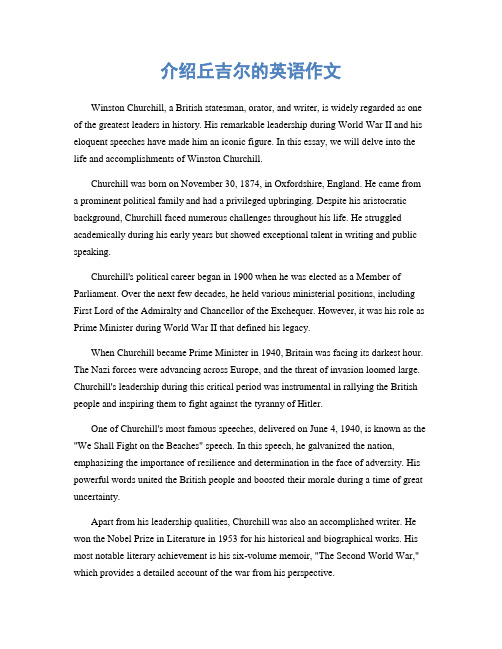
介绍丘吉尔的英语作文Winston Churchill, a British statesman, orator, and writer, is widely regarded as one of the greatest leaders in history. His remarkable leadership during World War II and his eloquent speeches have made him an iconic figure. In this essay, we will delve into the life and accomplishments of Winston Churchill.Churchill was born on November 30, 1874, in Oxfordshire, England. He came from a prominent political family and had a privileged upbringing. Despite his aristocratic background, Churchill faced numerous challenges throughout his life. He struggled academically during his early years but showed exceptional talent in writing and public speaking.Churchill's political career began in 1900 when he was elected as a Member of Parliament. Over the next few decades, he held various ministerial positions, including First Lord of the Admiralty and Chancellor of the Exchequer. However, it was his role as Prime Minister during World War II that defined his legacy.When Churchill became Prime Minister in 1940, Britain was facing its darkest hour. The Nazi forces were advancing across Europe, and the threat of invasion loomed large. Churchill's leadership during this critical period was instrumental in rallying the British people and inspiring them to fight against the tyranny of Hitler.One of Churchill's most famous speeches, delivered on June 4, 1940, is known as the "We Shall Fight on the Beaches" speech. In this speech, he galvanized the nation, emphasizing the importance of resilience and determination in the face of adversity. His powerful words united the British people and boosted their morale during a time of great uncertainty.Apart from his leadership qualities, Churchill was also an accomplished writer. He won the Nobel Prize in Literature in 1953 for his historical and biographical works. His most notable literary achievement is his six-volume memoir, "The Second World War," which provides a detailed account of the war from his perspective.Churchill's contributions to the world extended beyond his political and literary achievements. He was a staunch advocate for democracy, freedom, and human rights. His unwavering belief in these values made him a respected figure on the global stage.In conclusion, Winston Churchill's legacy as a leader, orator, and writer is unparalleled. His leadership during World War II, his inspiring speeches, and his literary works have left an indelible mark on history. Churchill's unwavering determination, resilience, and commitment to democratic principles continue to inspire generations to come. He will always be remembered as a symbol of strength and courage in the face of adversity.。
英文演讲稿范文丘吉尔

It is with great honor and immense respect that I stand before you today to deliver a speech inspired by the legendary Winston Churchill. As one of the greatest leaders in history, Churchill's courage, resilience, and unwavering determination in the face of adversity have left an indelible mark on the world.Today, I want to share with you some of the key lessons we can learn from Churchill's life and leadership. His words and actions continue to inspire us and remind us of the power of courage, unity, and perseverance.First and foremost, Churchill's unwavering commitment to freedom and democracy serves as a beacon of hope for all who value these principles. During the darkest days of World War II, Churchill's bold speeches and resolute stance against the Axis powers uplifted the morale of his nation and rallied the Allied forces. His famous quote, "We shall fight on the beaches, we shall fight on the landing grounds, we shall fight in the fields and in the streets, we shall never surrender," encapsulates the indomitable spirit of the British people.Secondly, Churchill's ability to adapt and overcome adversity is a testament to his leadership qualities. In the face of seemingly insurmountable challenges, he remained steadfast and resilient, never losing sight of his ultimate goal. This adaptability and perseverance are crucial in our own lives, as we navigate through the complexities of the modern world.Moreover, Churchill's emphasis on the importance of unity and collective action is a vital lesson for us all. He understood that the strength of a nation lies in its people coming together to support one another. His famous quote, "We are all in the same boat," reminds us that our destiny is intertwined, and that we must work together to overcome the challenges that lie ahead.In addition, Churchill's ability to inspire and motivate others through his oratory skills is a testament to the power of effective communication. His speeches were filled with passion, conviction, and a sense of purpose, which resonated with the hearts and minds of hisaudience. As leaders and individuals, we must strive to communicate our ideas and values with clarity and conviction, in order to inspire and mobilize others to join us in our endeavors.Furthermore, Churchill's commitment to lifelong learning and self-improvement is a reminder of the importance of continuous growth. He was a voracious reader, constantly seeking knowledge and wisdom. This thirst for knowledge and self-improvement allowed him to adapt to changing circumstances and emerge as a stronger leader.In conclusion, Winston Churchill's life and leadership serve as a shining example of courage, resilience, unity, and perseverance. His words and actions continue to inspire us to strive for greatness, to never give up in the face of adversity, and to work together for abetter future.As we reflect on the lessons from Churchill's life, let us remember to value freedom, unity, and perseverance. Let us strive to be leaders who inspire, motivate, and communicate effectively. And let us never forget that the power of one individual can indeed change the world.Thank you.。
丘吉尔简介英文作文

丘吉尔简介英文作文英文:Winston Churchill is one of the most iconic figures in British history. He was a politician, statesman, and writer who served as the Prime Minister of the United Kingdom twice, from 1940 to 1945 and from 1951 to 1955. Churchillis widely regarded as one of the greatest wartime leadersof the 20th century, and his speeches and writings continue to inspire people around the world.Churchill was born into a wealthy family in 1874 andwas educated at Harrow School and the Royal MilitaryCollege at Sandhurst. He served in the British Army for several years before entering politics in 1900. Churchill's political career was marked by a series of high-profile positions, including serving as Chancellor of the Exchequer, Home Secretary, and First Lord of the Admiralty.During World War II, Churchill's leadership was crucialin helping the United Kingdom and its allies defeat Nazi Germany. His speeches, including his famous "We shall fight on the beaches" speech, rallied the British people and inspired them to persevere through the darkest days of the war. Churchill's role in the war effort earned him widespread admiration and respect, both in the UK and around the world.Churchill was also a prolific writer, and his works include a number of books on history and politics. His most famous work is probably his six-volume memoir, The Second World War, which provides a detailed account of the war from his perspective as a key participant.Overall, Churchill's legacy is one of leadership, courage, and determination in the face of adversity. He is remembered as one of the greatest figures in British history, and his influence continues to be felt today.中文:温斯顿·丘吉尔是英国历史上最具代表性的人物之一。
介绍丘吉尔的英语作文
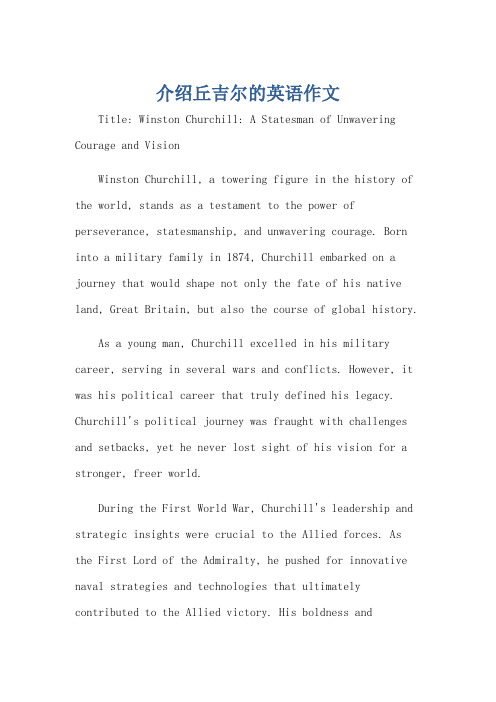
介绍丘吉尔的英语作文Title: Winston Churchill: A Statesman of Unwavering Courage and VisionWinston Churchill, a towering figure in the history of the world, stands as a testament to the power of perseverance, statesmanship, and unwavering courage. Born into a military family in 1874, Churchill embarked on a journey that would shape not only the fate of his native land, Great Britain, but also the course of global history. As a young man, Churchill excelled in his military career, serving in several wars and conflicts. However, it was his political career that truly defined his legacy. Churchill's political journey was fraught with challenges and setbacks, yet he never lost sight of his vision for a stronger, freer world.During the First World War, Churchill's leadership and strategic insights were crucial to the Allied forces. As the First Lord of the Admiralty, he pushed for innovative naval strategies and technologies that ultimately contributed to the Allied victory. His boldness andresolute spirit were evident in his famous speeches, which rallied the nation's spirits and inspired the troops tofight on.In the interwar years, Churchill's warnings about the rising threat of fascism went largely unnoticed. However,he never gave up on his beliefs and continued to speak out against the dangers of appeasement. His foresight and courage were once again tested during the Second World War, when he emerged as the prime minister of a nation facingits darkest hour.As prime minister, Churchill's leadership was nothing short of legendary. He rallied the nation, forged alliances, and led Britain to victory against the Axis powers. His speeches, filled with powerful imagery and rousing calls to action, became iconic not only in Britain but also across the globe. His famous "We shall fight on the beaches" speech is a testament to his unwavering determination and courage.Beyond his military and political achievements,Churchill was a man of immense cultural and intellectual curiosity. He was a prolific writer, publishing severalbooks on history and his own experiences. His wit andoratory skills made him a captivating figure on the world stage.What stands out most about Churchill is his unwavering commitment to freedom and democracy. He believed firmly in the inherent worth of every individual and the power of nations to rise above their differences and unite for a common goal. His vision for a peaceful and prosperous world was not just a dream; it was a guiding principle that he strived to realize throughout his life.In conclusion, Winston Churchill was not just a great leader but also a symbol of resilience, courage, and vision. His legacy continues to inspire generations, reminding us that with perseverance and courage, we can overcome any challenge and shape a better future for all. Churchill'slife and achievements are a powerful reminder of the impact that one individual, with a clear vision and unwavering courage, can have on the course of history.。
丘吉尔英文介绍

丘吉尔英文介绍Winston Churchill, born into an aristocratic family, was educated at Harrow and Sandhurst Royal Military Academy. He joined the British army in 1903 and was promoted to captain in 1905. In August 1914, he joined the British navy and participated in the First World War. In 1917, he was appointed as the British ambassador to the United States. In 1921, he became the Secretary of State for War, and the following year he became the British Prime Minister. In 1940, he served as the British Prime Minister, leading the British people to victory in the Second World War.Churchill was an outstanding speaker and writer, leaving behind a great deal of writing and speech. His "Memoirs of the Second World War" is one of the most comprehensive accounts of the war, while his "A History of the English-Speaking Peoples" is a classic work on British history.Churchill is considered one of the most popular politicians in British history, known as one of the "Three Big Guys" of World War II. He passed away in 1965 at the age of 91.。
丘吉尔英语作文
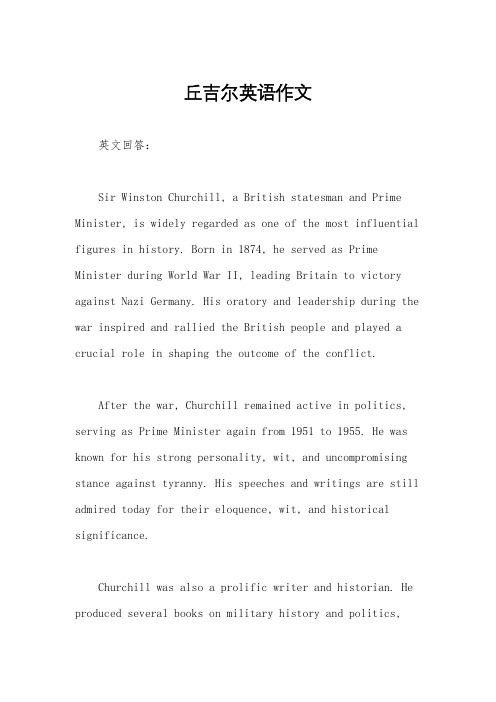
丘吉尔英语作文英文回答:Sir Winston Churchill, a British statesman and Prime Minister, is widely regarded as one of the most influential figures in history. Born in 1874, he served as Prime Minister during World War II, leading Britain to victory against Nazi Germany. His oratory and leadership during the war inspired and rallied the British people and played a crucial role in shaping the outcome of the conflict.After the war, Churchill remained active in politics, serving as Prime Minister again from 1951 to 1955. He was known for his strong personality, wit, and uncompromising stance against tyranny. His speeches and writings are still admired today for their eloquence, wit, and historical significance.Churchill was also a prolific writer and historian. He produced several books on military history and politics,including "The World Crisis" and "The Second World War."His literary works earned him the Nobel Prize in Literature in 1953.Churchill's legacy continues to live on. He is remembered as a brilliant orator, a courageous leader, anda staunch defender of freedom and democracy. His words and actions continue to inspire and motivate people around the world.中文回答:温斯顿·丘吉尔爵士,英国政治家和首相,被广泛认为是历史上最具影响力的人物之一。
Churchill(丘吉尔英文简介)
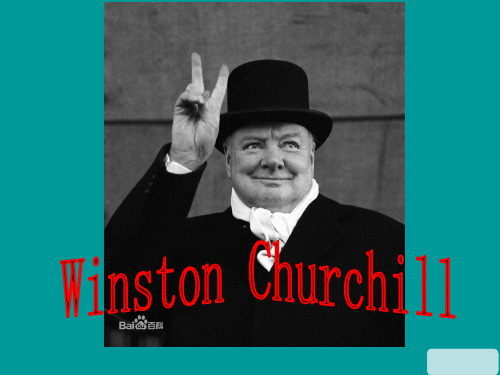
从让一个人生气的事情大小就能看出一个人的价值
Outline
• Brief introduction • Family background • Education • Military service • Political career • Famous saying
Winston Churchill
Education
• He was educated at three independent schools:St. George's School、Brunswick School、Harrow School. • Independent and rebellious by nature, Churchill generally had a poor academic record in school, for which he was always punished. So,in1893, his father sent him to Royal Military Academy Sandhurst (英国桑赫斯特皇家军事学院).
Military service
• In 1895, Churchill traveled to Cuba to observe the Spanish fight the Cuban guerrillas.His job was to write an article about guerrillas.Because of this article,he got his first medal. Since then, Churchill fell in love with writing. Also, in Cuba he acquired a taste of Havana cigars(哈瓦那雪茄), which he would smoke for the rest of his life.
